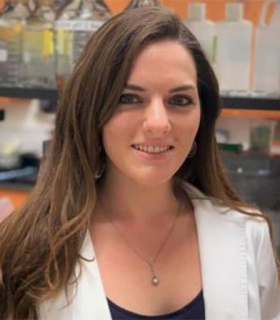Georgia State University
JOIN USGeorgia State University
JOIN US
Our team is built on the premise that complex problems are solved by innovative approaches that come from the integration of diverse perspectives. As such, team members come from a variety of backgrounds and pursue a broad range of careers in the biomedical sciences.


Biography
Eric G. Krause, Ph.D. received a B.A. in psychology from Hiram College. He went on to receive a M.S. in biological psychology and a PhD in neuroscience from Florida State University. Subsequently, he completed postdoctoral training in the department of psychiatry and behavioral neuroscience at the University of Cincinnati. While at the University of Cincinnati, Krause was the recipient of the National Institutes of Health’s K99/R00 Pathways to Independence Award, which helped him secure a tenure-track faculty position at the University of Florida. During his 12 years at the University of Florida, Krause rose to the rank of tenured professor and was the founding director of the Center for Integrative Cardiometabolic Diseases. In the Spring of 2023, Krause was recruited to Georgia State University as a core member of the Center for Neuroinflammation and Cardiometabolic Disease. Concurrently, he was appointed as an endowed Distinguished Investigator by the Georgia Research Alliance.
Education
2009 – Post-doctoral Fellowship in Neuroscience – University of Cincinnati
2005 – Ph.D. in Neuroscience, Florida State University, Tallahassee, Florida
2002 – M.S. in Biological Psychology, Florida State University, Tallahassee, Florida
1999 – B.A. in Psychology, Hiram College, Hiram, Ohio
Publications
Google Scholar:
https://scholar.google.com/citations?user=eARaJBIAAAAJ&hl=en&oi=ao
Krause NCBI Link:
https://www.ncbi.nlm.nih.gov/myncbi/eric.krause.1/bibliography/public/


Biography
Annette D. de Kloet, Ph.D., is an Associate Professor in the Neuroscience Institute at Georgia State University. Her scientific training began at an early age. Upon retiring from Florida State University’s Biology department, her father, with the assistance of her mother and three older brothers, started a biotechnology company. The company was initially focused on testing and research related to avian genomics and exotic bird diseases and Dr. de Kloet (Annette) was first exposed to conducting scientific research by working at this company throughout high school and college. In 2006, she received her B.S. in Chemical/Biomedical Engineering at Florida State University. She then completed her Ph.D. in Neuroscience at the University of Cincinnati (2007-2011), where she studied the neuroendocrine control of energy metabolism and obesity under the guidance of Professor Stephen C. Woods. Afterwards, she worked as a post-doctoral fellow in Physiology (2011-2014) in the laboratory of Professor Colin Sumners, where her research sought to delineate mechanisms by which the nervous system regulates cardiovascular function and contributes to hypertension. Prior to joining the Faculty at Georgia State University, Dr. de Kloet was Faculty in the Department of Physiology at the University of Florida, College of Medicine (Research Assistant Professor, 2014-2016; Assistant Professor, 2016-2023; Associate Professor with Tenure, 2023).
Education
2014 – Post-doctoral Fellowship in Physiology – University of Florida
2011 – Ph.D. in Neuroscience – University of Cincinnati
2006 – B.S. in Chemical (Biomedical) Engineering – Florida State University (Magna cum laude)
Publications
Complete List of Publications:
https://www.ncbi.nlm.nih.gov/myncbi/annette.de%20kloet.1/bibliography/public/
Google Scholar:
https://scholar.google.com/citations?user=pFAhUNgAAAAJ&hl=en&oi=ao


Biography
Karen Scott, Ph.D., is a Research Associate Professor in the Neuroscience Institute at Georgia State University. She has a broad background in systems neuroscience with a focus in the areas of stress, neuroendocrinology and cardiometabolic health. A key focus throughout her research career is understanding the mechanisms through which environmental and/or genetic factors engender susceptibility or resilience to pathological conditions in adulthood. She earned her Ph.D. in Neuroscience at the University of Cincinnati under the mentorship of Dr. Randall R. Sakai, studying the effects of prenatal stress on the social status of adult rats. She then pursued postdoctoral training in the laboratories of Drs. John F. Cryan and Timothy G. Dinan at University College Cork, Ireland, investigating the effects of ageing and stress on the gut-brain-microbiota axis. Following her postdoctoral training, Dr. Scott returned to the United States as a Research Assistant Professor in the Department of Pharmacodynamics at the University of Florida, working with Drs. de Kloet and Krause.
Education
2017 – Postdoctoral Fellowship in Neurogastroenterology, University College Cork
2012 – Ph.D. in Neuroscience, University of Cincinnati
2000 – M.S. in Animal Sciences, Purdue University
1997 – B.A. in Psychology, Pennsylvania State University
Publications
Complete List of Publications:
https://www.ncbi.nlm.nih.gov/myncbi/karen.scott.1/bibliography/public/
Google Scholar:
https://scholar.google.com/citations?user=KfPe3TYAAAAJ&hl=en&oi=ao


Biography
Francesca E. Mowry, M.S, Ph.D. joined the Krause-de Kloet Laboratory at Georgia State University as a Research Scientist in January 2024. During her graduate studies at Auburn University and postdoctoral work at Tufts University, Dr. Mowry’s research primarily focused on elucidating pathophysiological mechanisms in various neuroinflammatory and neurodegenerative diseases, including hypertension, Alzheimer’s disease, and multiple sclerosis. Currently, Dr. Mowry’s extensive background in histology- and microscopy-based approaches to neuroanatomical studies is being applied throughout the lab’s numerous research projects.


Biography
Khalid El Saafien, Ph.D. is a Post-doctoral Fellow in the Krause-de Kloet Laboratory at the Neuroscience Institute at Georgia State University. He earned his Ph.D. from the Florey Institute of Neuroscience and Mental Health, University of Melbourne, Australia. His doctoral training was funded by the Commonwealth Government of Australia through the Australian Research Training program. There, he trained as an integrative neurophysiologist with an interest in the autonomic control and regulation of blood pressure in renovascular hypertension. Following the completion of his Ph.D. he joined the Krause-de Kloet laboratory in late 2019, as a Postdoctoral Associate. During his postdoctoral training, funded by an American Heart Association Postdoctoral Fellowship, he gained technical expertise in advanced approaches to interrogate autonomic circuits that regulate blood pressure. This included the utilizing the Cre-LoxP system of genetic tailoring, virally directed gene transfer, advanced neuroanatomical tract-tracing, in vivo optogenetics and calcium imaging, and RNAscope in situ hybridization. In late 2024, he received a K99/R00 “Pathway to Independence” grant mechanism from the National Heart, Lung, and Blood Institute, allowing him to establish his own research program. Dr. El Saafien’s research program aims to utilize state-of-the-art approaches to interrogate the role baroreceptor containing afferents play in the development of renovascular hypertension. His goal is to establish novel therapeutic targets that alleviate hypertension.
Publications
Complete List of Publications:
https://pubmed.ncbi.nlm.nih.gov/?term=Elsaafien+K&cauthor_id=33328294


Biography
Jéssica Matheus de Sá, M.S., Ph.D. received a Pharmacy degree from São Paulo State University (UNESP), followed by Master’s and Doctorate degrees from São Paulo State University and Federal University of São Carlos (UNESP/UFSCar) in Araraquara, SP, Brazil. Her master’s and doctoral research were funded by the São Paulo Research Foundation (FAPESP), focusing on obesity associated with cardiovascular and hydroelectrolyte imbalance. Currently, Dr. de Sá holds the position of postdoctoral associate at the Center for Neuroinflammation and Cardiometabolic Diseases at Georgia State University in the Krause-de Kloet laboratory. Her work utilizes integrative state-of-the-art approaches such as manipulation of the transgenic mouse (Cre-Lox system associated with virally transduced proteins), in vivo optogenetic/chemogenetic, and mRNA in situ hybridization to elucidate neural mechanisms implicated in cardiometabolic dysregulation in response to high-fat diet induced-obesity.


Biography
Carly Vincent, Ph.D., is a postdoctoral research associate in the Krause – de Kloet Laboratory at the Center for Neuroinflammation and Cardiometabolic Disease at Georgia State University. She received her Ph.D. in Biomedical Sciences, Neuroscience from the University of South Carolina School of Medicine. Her doctoral training was funded by a University of South Carolina Support to Promote Advancement of Research and Creativity grant. There she trained as a behavioral neuroscientist with expertise in fear learning and memory. Dr. Vincent’s research line during her Ph.D. focused on uncovering the neural circuitry regulating fear generalization, as well as the role of glucocorticoid receptor activation in regulating sex differences in avoidance learning and extinction. Currently, she is utilizing her expertise in the neurobiology of fear to answer questions regarding the role of autonomic circuits in various fear learning and memory tasks. Where her work utilizes cutting edge techniques such as transgenic mouse lines, and in-vivo chemogenetics/optogenetics.


Biography
Dominique Johnson is a graduate student in the Krause-deKloet lab. She received a Bachelor’s degree from Bridgewater College in Bridgewater, Virginia. She then accepted a laboratory technician position in the laboratory of Drs. Eric Krause and Annette de Kloet where she began her studies in body-brain communication. In 2023, she started her graduate studies at Georgia State University where she leads a project that investigates mechanisms underlying how vagal sensory afferents regulate cardiometabolic function in male and female mice. She is currently testing the hypothesis that nodose ganglia neurons that express the oxytocin receptor utilize the mechanosensitive ion channel, Piezo2, to mediate cardiovascular and gastrointestinal function. Her project utilizes the Cre-Lox system where Cre recombinase is directed toward the gene coding for the oxytocin receptor bred with mice with LoxP sites flanking the Piezo2 gene to selectively delete Piezo2 from cells that express the oxytocin receptor.


Biography
Alexandra N. Rey Aponte is a first-year graduate student in the Krause-de Kloet lab with a Bachelor’s Degree in Neuroscience from Georgia State University. She is interested in studying the effects of stress on the neural control of cardiovascular function and is particularly enthusiastic about contributing to our understanding of mechanisms by which cardiovascular function is disrupted during stress-related disorders, like PTSD. As a new member of the lab, she is still exploring options for her dissertation research project. In the meantime, she is assisting with standard laboratory procedures, such as the surgical preparation of mice and the histological sectioning of mouse tissue samples.


Biography
Jeremiah Isaac is a graduate student in the Krause-de Kloet Lab with a Bachelor’s degree in Behavioral Neuroscience from Northeastern University. He is interested in studying the effect of early life stress on oxytocin signaling, and how these changes lead to long-term behavioral and cardiovascular aberrations. He is currently exploring specific projects for his dissertation while assisting with various projects in the lab.
Project: “Neuroimmune axis contribution to the pathophysiology of pulmonary hypertension”
NIH K99/R00 recipient
Current Position: Assistant Professor, Department of Pharmacology, University of Florida College of Medicine
Project: “The renin angiotensin system and cardiometabolic regulation.”
Current Position: Clinical Assistant Professor, Department of Pharmacodynamics, University of Florida
Dissertation title: “Gustatory and Interoceptive Regulation of Blood Pressure”
NIH Individual NRSA (F31) recipient
Current Position: Post-doctoral Fellow at University of Pennsylvania
Dissertation title: “An interrogation of brain oxytocin signaling: implications for dysregulated social behavior.”
Current Position: Scientist at BioMarin Pharmaceutical Inc.
Dissertation title: “Neuropeptide plasticity in hypothalamic paraventricular nucleus of salt-loaded male musculus.”
Current Position: Research Associate at the University of Florida
Dissertation title: “Brain renin-angiotensin system as a potential target to treat anxiety disorders.”
Current Position: Scientist at Philips BioSciences
Thesis title: “An optogenetic approach: Shedding light on the role of mPFC AT2R-containing neurons in anxiety-like behavior.”